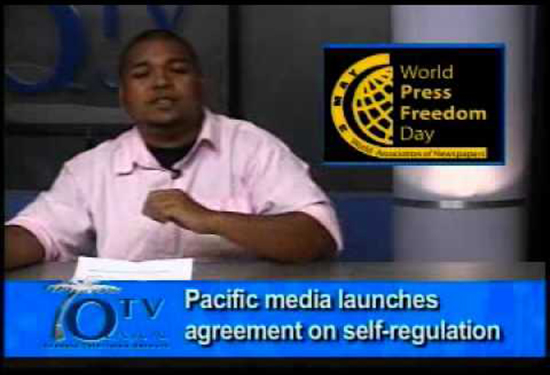
OPINION: Pacific regional stakeholders under Pacific Islands News Association (PINA) concluded in Noumea at the 3rd Pacific Media Summit earlier this month that regulation of media is necessary, but where the battle is being fought is the notion of the media being self-regulated, rather than governments imposing regulation.
Obviously the PINA leadership, with the secretariat in Suva, has opted to walk the path of self-regulation, living somewhat under the threat from the powers that be that “if you do not regulate, we will do it.”
But media regulation whether by the media itself or by an outside power is normally repulsive to someone who advocates strongly for freedom of speech and freedom of the media.
I find the term "self-regulation" almost offensive to my sensibilities as an advocate of media freedom.
The two notions are at odd with one another; you almost have to compromise one in order to support the other.
The preliminary findings of a feasibility study carried out by Dr Ian Weber, who has just resigned suddenly as the journalism programme coordinator at the University of the South Pacific was the focus of some of the discussions in the UNDP-sponsored workshop at Noumea.
As part of the feasibility study, a stakeholders’ survey collected perceptions of media self-regulation from 10 Pacific Island states – Federated Strates of Micronesia (FSM), Fiji, Kiribati, Palau, Papua New Guinea, Samoa, Solomon Islands, American Samoa, Tonga, Tuvalu and Vanuatu. Most of the respondents were from Fiji.
Common priorities
The feedback revealed common priorities across the region such as training and the need for public awareness on self-regulation. The feasibility study will be completed by April 2014.
But what are the implications of a regional self-regulation scheme? And what are the criteria that would drive such a self-regulation mechanism?
How can a regional scheme be established without making it work first in national contexts? Is this just another way of trying to establish a regional code of conduct and practice that stakeholders would adhere to in word and not necessarily in deed?
Obviously the current codes of ethics for national media associations are either inadequate or unable to meet the criteria of media conduct leading to the demands for self-regulation.
And how can self-regulation be monitored and even enforced, if this is the way of the future for media regionalism? Maybe this is where the idea of a regional media ombudsman comes in.
Obviously this issue of self-regulation is so important to PINA stakeholders that it became the main focus of this year’s summit, a gathering of regional media that takes place every two years.
Regulation has always been a tool used by governments to restrict freedom of speech. It is a tool used to restrain media from "speaking truth to power".
Media revolution
Now that governments have found their attempts at regulating media through legislations have been ineffective, particularly in this age of social media revolution, they are demanding another pathway to confine media.
Even though there are still Pacific nations where journalists and some media practitioners are being jailed, physically attacked or killed, most Pacific states have evolved into a friendly mode of trying to negotiate with media to be less confronting in their watchdog role.
Pacific journalists and media practitioners in the meantime have switched priorities. The issue now is no longer to be robust in the freedom of telling and writing stories of people, events, and issues, but in management of systems and schemes set up to increase corporate profit and work collaboratively with the powers that be.
Negotiating stance and principles is the new term for media to comply with the complex context of government domination and narrow vision in defending power and remaining unaccountable in their lack of transparency.
I admit that like other professions, media must continue to work at becoming more professional. Whether self-regulation fits into this mode or not is a question that must be critically asked.
It is possible to self regulate and still not be professional. What are we trying to get media to regulate anyway? Wouldn’t it be enough to strive for professionalism and everything in it that is necessary to produce results that align with the traditional and conventional roles of media?
Two serious conversations have been going on in the last several years in the region. One has to do with the idea of setting up a regional media ombudsman to handle complaints against media, a better option than taking the complaints to court.
Honiara discussion
This was discussed in Honiara in 2013 by a select group of media and other professionals, coordinated by the Pacific Freedom Forum (PFF).
The other, as evident in Noumea, focused on the notion of self-regulation.
There have been notable amendments to some of the islands states constitutions in order to restrict freedom of the media.
There is hardly a constitution in any island state without a clause on freedom of speech and freedom to publish, normally stated strongly as a human right.
Many a tension between government and media in any nation revolves around this issue of freedom.
But, now there is the notion that is being introduced for discussion and consideration by the primary regional media association, PINA, and funded by organisations like PACMAS and UNDP, that the media needs to self-regulate.
Whether this will assist in developing media to be more professional or not is yet to be seen. But there is something strangely apparent in this whole discourse; there are some governments in the region that are putting pressure on regional media to self-regulate or else!
Pacific media self-regulation at PINA
This work is licensed under a Creative Commons Attribution-NonCommercial 3.0 New Zealand Licence.




